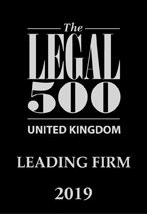Bell Lax acted for the appellant regarding this matter of family and insolvency law.
On 9 November 1994 in family proceedings, Bell Lax’s client was ordered, inter alia, to pay £22,500 to his former wife together with two-thirds of her costs to be taxed subject to the usual restriction against enforcement in respect of the post-legal aid period. Mr Russell did not pay the same and on 17 March 1995 his wife served on him a statutory demand for £22,500 and the costs which as at that date had not yet been taxed.
Mrs Russell issued a bankruptcy petition in respect of the sum of £ 22,721.92 (£ 22,500 and interest thereon) and the costs under the order of 9 November 1994.
On 4 May 1995 Bell Lax’s client was also ordered to pay the costs of the Church Commissioners in separate proceedings.
Mrs Russell’s petition was ultimately heard on 24 November 1995 when judgment was reserved. On 2 January 1996 Mr Russell’s liability in respect of his wife’s costs was quantified in the sum of £ 18,843.73. The district judge made a bankruptcy order on 12 March 1996.
Bell Lax appealed against this order on behalf of its client. Bell Lax argued that it was not appropriate to make a bankruptcy order on a petition in respect of a debt which arose under a lump sum order in family proceedings; the district judge erred in law in making a bankruptcy order on a petition presented in respect of a debt which is not provable in the bankruptcy.
The appeal was unsuccessful. The court ruled that an order made in family proceedings can be a bankruptcy debt albeit a bankruptcy debt of a special nature; the debt is not a provable debt in the bankruptcy.
Bell Lax argued that because the liability to pay the lump sum could not be proved in the bankruptcy, the trustee in bankruptcy would therefore have no function to perform in relation to Mrs Russell; a bankruptcy order should not, as a matter of discretion, be made at the instance of such a creditor.
Despite this position, the appeal court ruled that due to special circumstances, namely, amongst other things, Mr Russell had been less than frank in disclosing to the court particulars of his income and capital, in this instance the application should be successful.
This case represents an interesting interpretation by the courts regarding the special nature of debts arising from orders made in family proceedings. Although such debts can be recognised as bankruptcy debts, they are bankruptcy debts that are not provable in bankruptcy.







